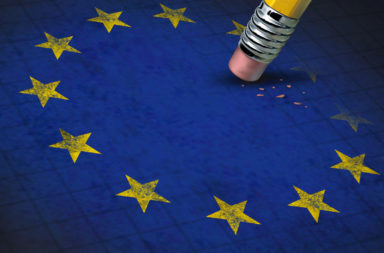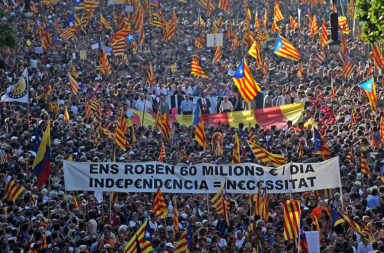By David Marsh
No European leader has ever even attempted to mimic the rhetoric of John F. Kennedy in his January 1961 inauguration address. There is no way any European government chief could say: ‘And so, my fellow Europeans – ask not what Europe can do for you, ask what you can do for Europe.’
Perhaps, though, David Cameron, the UK prime minister, was trying to be a trifle Kennedy-esque when, in January 2013, setting out his plans for a referendum on British membership of the European Union, he said, ‘I don’t just want a better deal for Britain. I want a better deal for Europe too.’
In the ensuing three years, Cameron’s address has taken on a deeper resonance. Partly for reasons that are not of the British prime minister’s making, it could mark the descent of a permanent black cloud over Europe.
What started off largely as a domestic political device to defuse dissent over Europe within his Conservative party has become a major source of division with and within the rest of Europe, with large implications for international security policies as well as the health of the global economy. The decision over a British exit could be the major political event of 2016.
Whatever the outcome, Cameron may be seen by historians as having helped strengthen the forces of fragmentation seemingly sweeping inexorably across the Old Continent.
Three developments are responsible for the transformation.
- First, Cameron handsomely won the May 2015 general election, largely because of the improving UK economy, even though most polls at the time were predicting a stalemate – giving him the chance of going ahead now with referendum plans that were earlier mired in doubt.
- Second, the Russian invasion of Crimea, the emergence of Islamic State and the European refugee crisis have given Britain’s membership or non-membership of the EU an added security dimension that was previously much less visible. Cameron himself, as well as Conservative grandees such as Sir John Major, a former prime minister, now say that Britain needs to remain in the EU to make the world a safer place. Such statements have earned hostility from anti-EU Conservatives who say their leaders are giving in to pro-EU blackmail without having won any concessions over the terms of UK adherence.
- Third, the EU remains in a mess politically and economically, with growth sluggish, large-scale unemployment in many counties and radical parties posing a threat to government stability across the continent. Most European partners wish Britain to stay in. This remains the most likely outcome when the referendum is eventually held, probably in summer 2016. Yet cutting a deal is much more difficult at a time of depressed spirits compared with the recovery that, three years ago, Cameron may reasonably have expected for 2016.
In 2013, by agreeing to Conservative demands for an EU plebiscite, but clothing his call for EU reform with generally pro-European rhetoric, the prime minister appeared to achieve the difficult feat of neutralising his domestic adversaries and simultaneously stretching out a constructive hand towards fellow European leaders. At the time, framing proposals for a more efficient, flexible and competitive Europe appeared an act of statesmanship.
Three years later, perspectives have become a lot bleaker. Whatever the result of the vote, Cameron may not succeed in cauterising persistent wounds over Europe in his own party. Furthermore, win or lose, in or out, Mr Cameron could be saddled, somewhat unfairly, with the historical blame for promoting the progressive disintegration of a continent that once set its seal on unity but now seems destined for dissection and divisiveness.
David Marsh is managing director at OMFIF.




